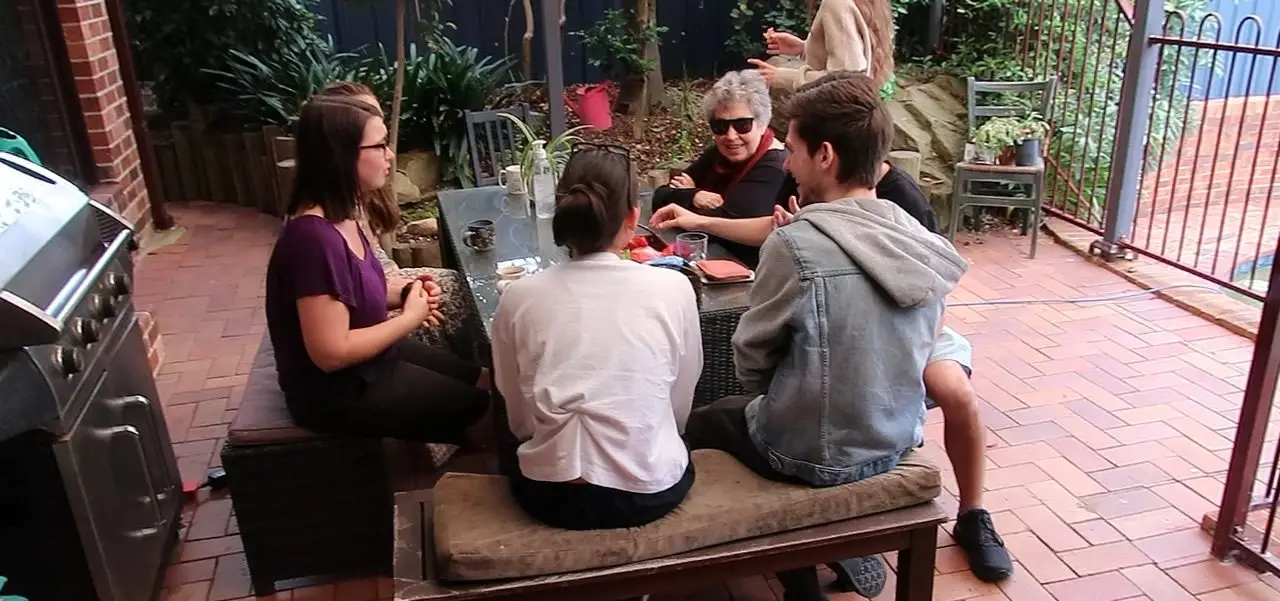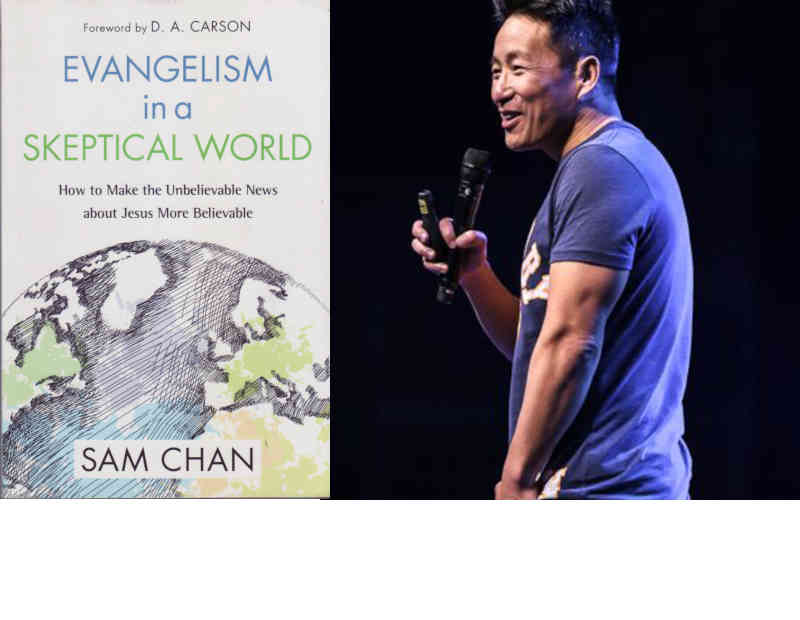I was given this Sam Chan book by a friend, and I must admit I didn’t have high expectations.
I no longer identify with the Reformed evangelical theology Sam follows, and I think its evangelism can be crass and ineffective.
And I did find things I couldn’t agree with, but I also found very helpful insights based on a culturally-sensitive approach. If you are interested in communicating faith into a postmodern culture, there is a lot here to like.
[Note to US readers: “evangelical” in Australia (and perhaps elsewhere) doesn’t have the right wing political and ultra conservative social overtones it appears to have in the US. It simply means a Protestant Christian who believes strongly in the Bible and (hopefully) in evangelism.]
Sam Chan
Sam is an Aussie who has specialised in communication and evangelism – completing a PhD and travelling the world giving talks, running training courses and writing books.
Sam observes that too many pastors and leaders urge us to evangelise, but do little or nothing to equip us to do it. This book, with its many stories and practical examples, is his attempt to equip us to share our faith in a relevant way.
Here are some of the things that stood out to me.
The gospel: one size doesn’t fit all
Sam begins with a fairly conventional theology of evangelism. But then he identifies several different attitudes people may have to Christian belief, each one requiring different approaches to evangelism. People are converted in different ways.
It’s not rocket science, but it seems many Christians and many churches use the same evangelism message every time. So right from the start, Sam challenges some aspects of conventional evangelicalism.
And this is a theme throughout the book: think about what is the best way to approach this person, this culture, this viewpoint.
Later he points to the Bible’s use of different metaphors for sin and salvation, and different models or theories of the atonement (penal substitution, ransom, redemption, victory, etc). These can form the basis different approaches to evangelism, whatever is most meaningful to the person we are sharing with.
This may be anathema to some evangelical churches which insist on Penal Substitutionary Atonement, but it is Biblical and thoughtful.
The role of community in belief
Sam observes that our current beliefs form “plausibility structures” that often determine what we are willing and able to believe. And the community we belong to strongly influences our plausibility structures.
And so, community has an important role in evangelism.
Therefore he suggests Christians should be seeking to get their Christian friends and their non-believing friends together in social gatherings. Have coffee and dinner with our friends. Listen to their stories. Then, when the time is right and they want to hear, tell them our story.
Sam’s approach emphasises how important it is for Christians not to live in a bubble, but be fully engaged in the secular world, to understand culture, to have secular friends, and to serve and do good.
There is a difficulty here which I don’t think he really addresses. If we are strategising to evangelise our non-believing friends, are they really friends or just targets? It seems to me that while evangelising may be the most important thing we can do (and I’m not entirely sure about that), our friendship must be primary and real, and evangelism a possible outcome.
Even if our friends vehemently reject Christian faith, our friendship must be genuine and ongoing, otherwise it isn’t real friendship.
Christianity and postmodernism
Sam gives a helpful summary of the differences between modernism, where truth can be certain, factual & universal, and postmodernism, where truth is uncertain, subjective and biased.
While the change from modernism to postmodernism isn’t clearcut, we are all affected by it. Which means (again) we need to understand the culture around us. Things that would have been meaningful a few decades ago may not be so clear today.
Most forms of Christianity in the west are strongly modern – absolute truth, God’s truth, Christian truth vs other religions, etc. But most secular people we talk to today will be suspicious of religious absolutes, they will likely believe all religions contain truths, and tolerance will be their strongest virtue.
Christians have often been suspicious of postmodernism, but Sam suggests we should respond with evangelism based less on facts (initially) and more on authenticity, hospitality, testimony & stories, to show that Christian faith is livable and significant. Then our friends may be open to hearing what we might call “the gospel”.
The importance of culture
It is obvious to overseas missionaries that they need to understand the culture of the people they are seeking to evangelise. Each culture has its own assumptions and stories.
It is also obvious, once you think about it, that most of us live in multicultural societies, and so our evangelism equally must take acount of these assumptions and stories.
Sam further emphasises that each of us is also enculturated, and we each have our own preferred assumptions and stories. How we read and explain Biblical truth will be different to how Isaiah or Jesus or Paul did. And these differences may lead to different interpretations. For example, Christians may see the woman at the well in John 4 as a sinner, but other cultures may see her as a victim.
So Sam suggests some helpful approaches and questions:
- Understand and interpret other cultures by seeing how they answer questions like what does it mean to be human, how do they see the universe, etc.
- Look for story lines in the culture and try to understand and empathise with them before challenging them.
- Find redemptive analogies in that culture – aspects of culture that can be used to illustrate a Christian truth.
- Ask questions like: What kind of English will I use? What illustrations? What metaphors?
Ultimately, he suggests we approach evangelism in three stages:
- Resonate: understand and empathise with their presuppositions.
- Dismantle: show inconsistency or deficiency.
- Gospel: complete their cultural storyline with the gospel.
While I can see the logic in this, it can come over as patronising, polarising and impersonal, things postmodern culture is opposed to. I feel a slightly less judgmental approach, with less telling and more sharing of what we’ve found, over a longer period, may be better.
Truth, feeling and lives
Apparently the ancient Greeks thought there were three components to any communication:
- Logos: what we say.
- Pathos: how the other person feels.
- Ethos: the way I live.
Sam suggests we’ve focused most on logos in the western church, but pathos and ethos may be more important these days. Facts and evidence are important, but they’ll rarely be enough.
Talking the gospel
Sam emphasises the value of story telling and relationship in communicating the good news. But then he spends a couple of chapters on how to give an evangelistic talk in several different contexts. While this is no doubt important for some, I feel he could have given greater emphasis to creative ideas on how to build day-to-day relationships, how to demonstrate the good news by serving, and how to let our conversations be seasoned and grace-filled (Colossians 4:6).
I also feel disappointed that the Holy Spirit is hardly mentioned. Evangelicals may have an impeccable doctrine of the Spirit, but they seem to think the Spirit’s work is automatic and the gifts of the Spirit are no longer available like they were in the early church.
Prayer, asking for specific guidance from the Spirit and the use of gifts like prophecy, word of knowledge and healing (where genuine – this is another issue altogether!) would greatly enhance our evangelism.
Apologetics
Sam ends the book with a chapter on answering difficult questions and “defeater beliefs” – viewpoints non-believers may hold that will be a barrier to them hearing and accepting the Christian faith. He discusses issues such as other religions, hell, science, Christian hypocrisy and problems with the Bible. In each case he suggests how the scheme of resonate – dismantle – gospel can be used to respond to these issues.
I feel this is the weakest part of the book, for two reasons:
1. It doesn’t work
We both agree that strong disbelievers are unlikely to change their views easily. But I have had long experience in discussing with thoughtful non-believers and doubting believers, and I don’t believe either group will be impressed by his approach, which tends to divert from or minimise the real question and focus on a “gospel” response.
His approach may initially be helpful to committed and confident Christians, but may in the end lead them into a false confidence that doesn’t stand up to closer scrutiny in later life (see #2 below) and may thus ultimately harm them.
2. Is isn’t always true
Having stressed the need to be open and questioning about our own beliefs and practices, Sam seems to have accepted the standard evangelical line on these matters, and sometimes it isn’t Biblical or true (in my view). So while he has some thoughtful things to say, his first priority, in common with many evangelists, doesn’t seem to be finding and presenting truth, but evangelising. For example:
- Other religions. His treatment is very black & white, and so doesn’t properly recognise (i) God doesn’t use a theology exam to judge us, and his grace may be far wider than Sam thinks, and (ii) a more inclusivist (not universalist!) view is suggested by Romans 2:12-16.
- Hell. Again he doesn’t (and can’t, given his theology) really address, much less answer, the horrendous awfulness of the eternal conscious torment doctrine he appears to hold. Nor does he seem to be aware that, when examined, it isn’t actually a biblical teaching. Sensitive questioners will be repelled by his acceptance of so much unbearable suffering.
- The Bible. Again in common with many evangelicals, he sidesteps the very real issues in BIblical (especially Old Testament) consistency and morality, and uses the strategy of finding dissonance in the other person’s beliefs about the Bible – which, of course, doesn’t answer the question.
I feel strongly that our apologetics must be honest and based on deep reflection and investigation of the issues, not just looking for ways that work.
Well worth reading
I have disagreements with quite a few things in this book. But there is much that is helpul.
Sam showed good understandings of culture and communication. He stressed understanding, flexibility and empathy. He gave me plenty to think about and apply.
I think everyone would benefit from reading this book. Just be ready to question and consider his theology in places.
Photo of Sam: City Bible Forum.
Read more

Evangelism in the twenty-first century
Society has changed since Billy Graham, so evangelism needs to adapt to stay relevant. Here are some ideas to do that.

Why evangelism needs to change
The way we share faith with people outside the church must change to suit the times.

Making young disciples in the 2020s
Ideas on passing on faith to the next generation, based on many years of experience.

Leave a Reply